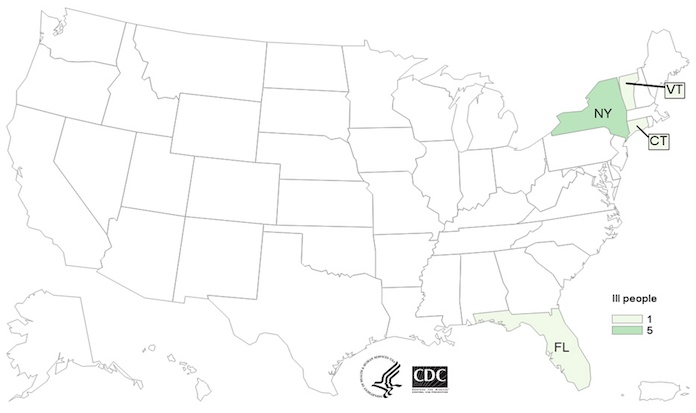The multistate outbreak of listeriosis linked to Vulto Creamery soft raw milk cheese is over, according to the Centers for Disease Control and Prevention (CDC). In all, eight people were sickened in four states. That is an increase of two more cases since the last update on March 13, 2017; both of those patients live in New York.

All eight people were hospitalized because of their illness, and two people died, one from Connecticut and one from Vermont. One illness was reported in a newborn. The CDC is still recommending that consumers do not eat, restaurants do not serve, and retailers do not sell recalled raw milk cheeses made by Vulto Creamery.
The raw milk cheeses from the Creamery were distributed nationwide. But most were sold at retail locations in the northeastern and mid-Atlantic states, along with California; Chicago, Illinois; Portland, Oregon; and Washington, D.C.
The CDC collaborated with public health officials in several states, along with the FDA to investigate this outbreak. The PulseNet system was used to identify illnesses that were part of this outbreak. All eight people identified in the outbreak were infected with the outbreak strain of Listeria. Whole genome sequencing (WGS) showed that the isolates from the patients were closely related genetically.

Attorney Fred Pritzker said, “Listeria monocytogenes causes serious illness and death.” Contact him at 1-888-377-8900.
Attorney Fred Pritzker, who represents people sickened with Listeria monocytogenes food poisoning, said, “soft raw milk cheeses pose a health risk. This is not the first time, and it won’t be the last, that unpasteurized dairy products have made people seriously ill.”
Ill people ranged in age from less than one year to 89, with a median age of 52 years. Five of the eight ill persons were female.
Epidemiologic and laboratory evidence indicates that soft raw milk cheese made by Vulto Creamery of Walton, New York, was the likely source of this outbreak. Based on interviews of patients, state and local health departments found that eight of eight people, or 100% in this outbreak, ate a soft cheese in the month before they got sick. Cheese made by Vulto Creamery was for sale at stores where at least seven of the ill persons bought cheese before their illness began.
The Connecticut Department of Public Health took leftover cheeses from the home of the deceased person in Connecticut. The outbreak strain of Listeria monocytogenes was found in that cheese; it was identified as Ouleout cheese from Vulto Creamery. Then, the New York Division of Milk Control and Dairy Services collected three intact wheels of Ouleout cheese from Vulto Creamery. The outbreak strain of Listeria monocytogenes was found in those cheeses.
Vulto Creamery recalled all lots of Oulelot, Miranda, Heinennellie, and Willowemoc soft wash-rind raw milk cheeses on March 7, 2017. On March 10, 2017, the recall was expanded to include four other cheeses: Andes, Blue Blais, Hamden, and Walton Umber. If you purchased any of these cheeses, do not eat them. Throw them away in a sealed container. Then clean out your refrigerator with a solution of one tablespoon liquid chlorine bleach to one gallon of hot water, since the bacteria can grow at temperatures below 40°F.
The symptoms of listeriosis include high fever, stiff neck, severe headache, nausea, diarrhea, and vomiting. Symptoms usually begin one to two months after exposure to the pathogenic bacteria. If you ate any of the raw milk cheeses from Vulto Creamery and have experienced these symptoms, see your doctor.
America’s food safety law firm, Pritzker Hageman, successfully represents patients who have been harmed by adulterated food products throughout the country. Its lawyers have won hundreds of millions of dollars for foodborne illness survivors in lawsuits, including the largest verdict in American history for a person harmed by E. coli and hemolytic uremic syndrome. The firm also publishes the E-news site, Food Poisoning Bulletin, a respected source for food safety news and information. Pritzker Hageman lawyers are often interviewed by major news outlets, such as the New York Times, CNN, and the Wall Street Journal. The firm also represents those harmed by pathogenic microorganisms in Legionnaires‘ disease, surgical site infection and product liability cases.




